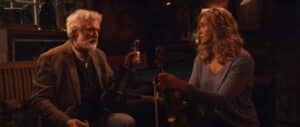When Finley Sinclair (Rose Reid), an aspiring violinist, fails her audition for the Manhattan Conservatory of Music, she feels like prayer to God has let her down. So, she decides to take a semester abroad in a small coastal town in Ireland. As she sets out, there’s no way for her to know that the experience will unlock her heart and her musical passion.
On the plane, she’s seated next to Beckett Rush (Jedidiah Goodacre), a young heartthrob movie star, on his way to a film shoot in the same town. The two do not hit it off, especially when Finley sees a magazine article detailing Beckett’s bad boy reputation. He tells her that things are not always as they seem.
Finley’s host family owns a B&B and when she finds out Beckett is staying there, she’s less than thrilled. But Beckett insists on being Finley’s tour guide to all her new environment has to offer. Through Beckett, she meets Seamus (Patrick Bergin), an elderly homeless gent, who just happens to be a fantastic fiddler. He’s also a favorite entertainer at the local pub. When Seamus calls on Finley to join him on stage, she begins to understand that there’s more to playing than getting the notes right.

Forced by a school service project to “adopt” a local senior citizen, Finley gets paired with Catherine Sweeney (Vanessa Redgrave), a nursing home resident who wants nothing to do with her. Despite Catherine’s rude behavior, Finley keeps on visiting and Catherine slowly opens up to her, revealing a devastating secret that fuels her abrasive exterior.
Beckett describes Finley well when he calls her “uptight.” But the more time she spends with the people she meets in Ireland, the more she takes Beckett’s advice to look beneath the surface of people to their hearts, the more her own heart begins to open up, slowly dispelling her uptightness.
“Finding You,” is based on the Christian YA novel, “There I’ll Find You” by Jenny B. Jones. The film downplays the religious themes of the book but God’s providence and care seeps into the movie, especially as Finley goes on a hunt, spurred on by a clue left by her deceased brother, who had stayed with the same host family when he studied in Ireland four years earlier. At one point, a still-grieving Finley tells Beckett, “If I could see what he saw, maybe I could have what he had.”

During the first few minutes of the film, I thought it was going to be just another celebrity-and-non-celebrity-fall-in-love movie such as “Notting Hill,” but at the end I was pleasantly surprised at the film’s depth. Once Finley gets to Ireland, her experiences teach her to do something that we all could benefit from, namely, not judging others based on first impressions but taking the time to get to know another person on a deeper level. Doing that opens one up to hurt but having the courage to be vulnerable with another can also lead to healing, reconciliation, and an unlocking of creativity. Beckett’s anthem throughout the film that “sometimes things aren’t always as they seem” can be a good reminder for the rest of us to open our hearts and eyes to what God wants to show us. It may come in very unexpected ways.



